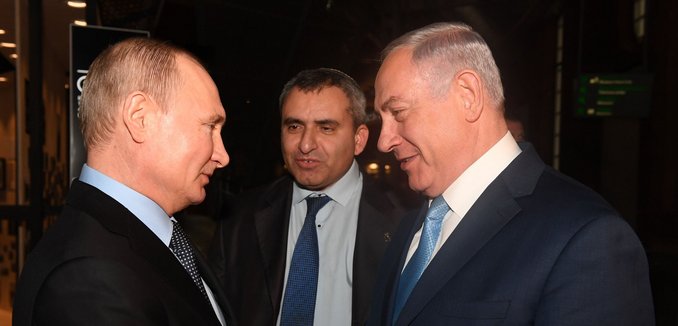In talks with Russian President Vladimir Putin, Israeli Prime Minister Benjamin Netanyahu told Putin that Israel would not tolerate an Iranian military presence in Syria or making Lebanon into “factory for precision missiles” to attack Israel, The Jerusalem Post reported Monday.
Regarding Iranian efforts to establish a base of operations in Syria, Netanyahu said, “I made clear to Putin that we will stop it if it doesn’t stop by itself. We are already acting to stop it.”
The prime minister’s comments about the missile factories in Lebanon come at a time in which Israel has launched a diplomatic campaign warning that Jerusalem would not tolerate the manufacture of precision missiles in Lebanon that would threaten Israel.
Netanyahu, who traveled to Moscow for his seventh face-to-face meeting with Putin, was accompanied by Israel’s Chief of Military Intelligence, Maj.-Gen. Herzi Halevi. Russian Defense Minister Sergey Shoygu also attended the talks. The two leaders met privately for an hour and a half and were later joined by their staffs for talks on bilateral issues.
Netanyahu described the meetings as ensuring that the two countries “don’t clash,” even with Russian troops stationed in Syria. He also said that they discussed “scenarios of escalation” in the Middle East and how those situations could be addressed. The Prime Minister said that Lebanon and Syria could be stabilized, but that Iran was working to keep both in turmoil.
Netanyahu also told Putin that if problems surrounding the nuclear deal were not addressed, he believed it likely that the United States would exit the deal.
In addition, Netanyahu and Putin marked International Holocaust Remembrance Day by attending the opening of the Moscow’s Jewish Museum and Tolerance Center’s exhibit “Sobibor: Victorious over Death,” which commemorates the uprising against the Nazis at that death camp led by Red Army officer Alexander Pechersky.
Prior to Netanyahu’s meeting with Putin, Zvi Magen, a former Israeli ambassador to Russia and currently a researcher at Israel’s Institute for National Security Studies (INSS), spoke with The Israel Project about expectations for the meeting. Magen said that Netanyahu had an opportunity to exploit tensions between Russia and Iran, and convince Putin to respect Israel’s concerns about an Iranian military presence in Syria.
“I believe that there are tensions or problems between Russia and Iran about the future order in Syria,” Magen said. “Not everything is so bright and light as we believe (…) so mainly Netanyahu’s position and his presence is helpful for Putin to continue his negotiation with Iran about their presence or the lack of their presence in Syria.”
A complete recording of the call with Magen is embedded below.
[Photo: Prime Minister’s Office / Twitter ]




